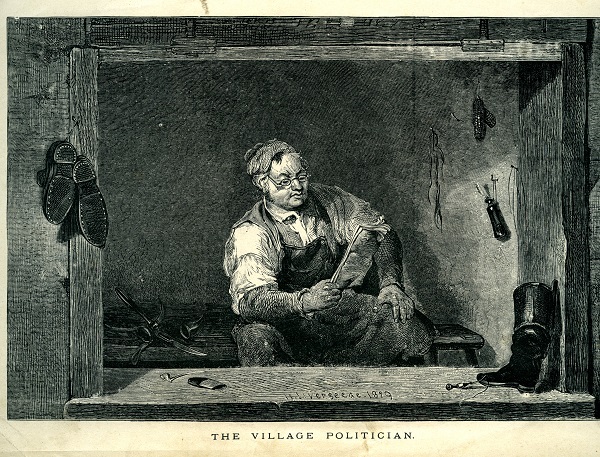Shoes
Northampton shoemaking - good quality footwear

The village politician by Henry Liverseege, 1819
Known for quality
Northampton’s shoemaking reputation as producers of good quality men’s footwear was sealed when a group of shoemakers, including Thomas Pendleton, obtained a contract for 2,500 shoes to be made for Oliver Cromwell’s parliamentary army going to Ireland in 1649.
Making a mark
In 1660 Thomas Fuller, the Northamptonshire born historian and churchman wrote that ‘the town of Northampton may be said to stand chiefly on other men’s legs the most cheapest, if not the best, boots…in England are to be bought in Northampton.’ By 1725 Daniel Defoe, writer and journalist wrote “Shoes from Northampton for all, the poorest countrymen and the master.”
Shoe wholesalers
From the 1830s, the increasing demand for shoes meant that individual shoemakers could not supply such large quantities. A largescale outdoor system was introduced. This saw wholesale shoemakers or entrepreneurs distributing leather to shoemakers who were subcontracted to supply their skills. These shoemakers worked individually by hand, usually in a workshop at home. Quite often wives, children and other family members helped too.
Transportation
The development of a canal system reaching Northampton in 1815 saw an unparalleled growth in the shoe industry. The large markets of the country became accessible and stimulated increased production.
Division of labour
In 1836, one manufacturer, William Parker, made 80,000 pairs a year (20,000 pairs of boots and 60,000 pairs of shoes). A third of his production was sold in Manchester and the rest in London. By 1841 the census lists 1,821 shoemakers in the town. People were now starting to be a called by different names including manufacturers. By the 1851 census the division of labour was becoming more distinct with closers, clickers and shoe binders appearing as specialist occupations. The revolution in transport opened up the markets available across the country, but for the industry to really prosper and grow another revolution was needed which took the form of the introduction of machinery transforming the industry in to a mass production one.
